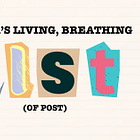Hello again. Or, hello for the very first time!
I hope you’re well in every way you can be. I am well and I owe it all to art. I’d like to share some of it with you, and perhaps it’ll feed you, too…
This art is from the Amazon and it is called Wasca.
It follows hayakwaska, or ayahuasca as it’s come to be known, and its recent extraction leading to environmental destruction, cultural exploitation, and marginalization of Amazonian people, all in the name of healing and wellness.
Wasca is a documentary of sorts, but I feel strange calling it a documentary because in it, there are no talking heads. No “experts” personally removed from the subject at hand, telling us, the viewer, what hayakwaska means to its people. Instead, indigenous storyteller Nina Gualinga and her people, the Kichwa of Sarayaku, Ecuador, speak of their land in their own words.
They tell us that their spiritual connection to the hayakwaska plant once helped them protect their land from devastating oil extraction by the Ecuadorian state. And now, that very plant is being colonized and exploited by people who don’t know or care who they hurt by using it.
At one point, a Kichwa elder said, “How can those who do not live here possibly understand how our life systems are connected between plants, animals, community, culture, and knowledge? Growing up in the forest we learn to know and love her deeply. When hayakwaska is taken out of its original context it becomes superficial and self centered.”
I was so moved by all the truth they told, and the way they told it. There is no better way to finish this story, really, than to experience their telling it first hand…
I could speak for hours of the way this story connects so closely to others all around the world. The Congo and cobalt, my city Memphis’ water and xAI, the Standing Rock Sioux Tribe and the 2016 attempt at a destructive pipeline on their sacred land. It is the shared history for every single Black and Indigenous people harmed by colonization and globalism, since the beginning of white reign.
We know. We know the sacredness of land and earth and our connection to it, and the many excuses (cell phones! technological progression! the global economy!) white supremacy says it must destroy.
We also, though, must know our power. We, the people of those sacred lands. Wasca has reminded me of that power, and the constant urge for us all to forget; to exist as if we are not us. As if we’re something less.
I choose to celebrate us. I choose to remember.
…Won’t you celebrate with me, like Lucille Clifton said?
“…Come celebrate / with me that everyday / something has tried to kill me / and has failed.”

Now, some news! My memoir Pansy is a finalist for the Quill Prose Award!
I’m so grateful for the recognition. I have many complex feelings about literary awards but at the base of things, it simply feels good to know other people appreciate this work. And what warms my heart even more?! Some of you literally funded my submission to that very award. Thank YOU. This has truly been a community project, y’all.
I’m so, so grateful for all the love this book has been getting. Not too long ago, it won Best Young Adult Nonfiction at the 3rd annual Richard Wright Literary Awards, and as of yesterday, it put me on the cover of Artist Feature Magazine. On top of that, Pansy continues to get shout outs from reviewers and publications I respect.
Please, if you feel so inclined, share some good news of your own in the comments.
Let us celebrate you. Let us celebrate us.
I’ll leave you all with this interlude from Vince Staple’s latest album, Dark Times.
Read more from Jasper:





Go you!!!!
Congratulations! As personal response to your question, I'm celebrating my kids today. Both are Black British, both have faced many struggles, both are overcoming the crap that life throws at them and are making their way. Strong, joyful, determined. You know how much heartbreak our society puts onto young Black people. And how wonderful it is when, despite it all, they keep on going.